Jesus and the Gospels
Lesson 9 - John II
Jesus and the Gospels
The Gospel of John
Lesson II
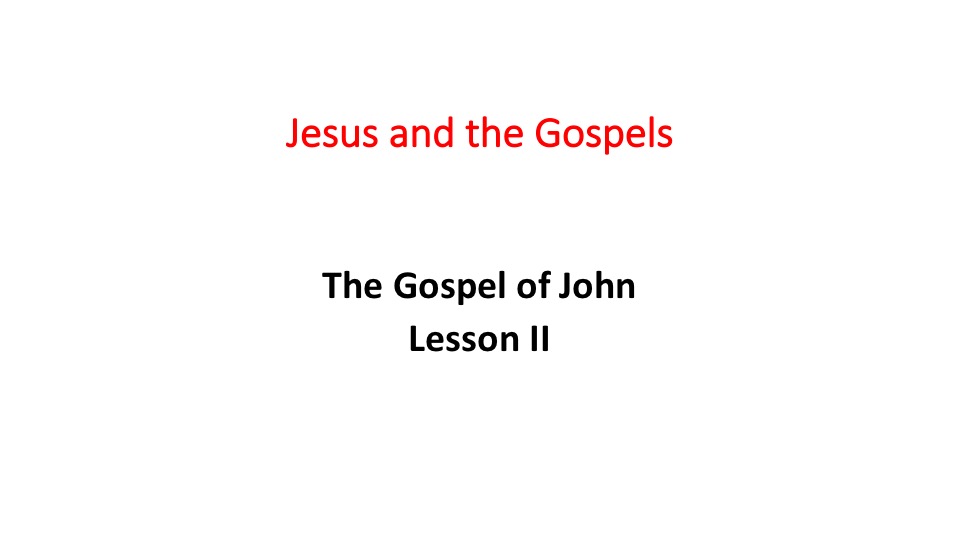
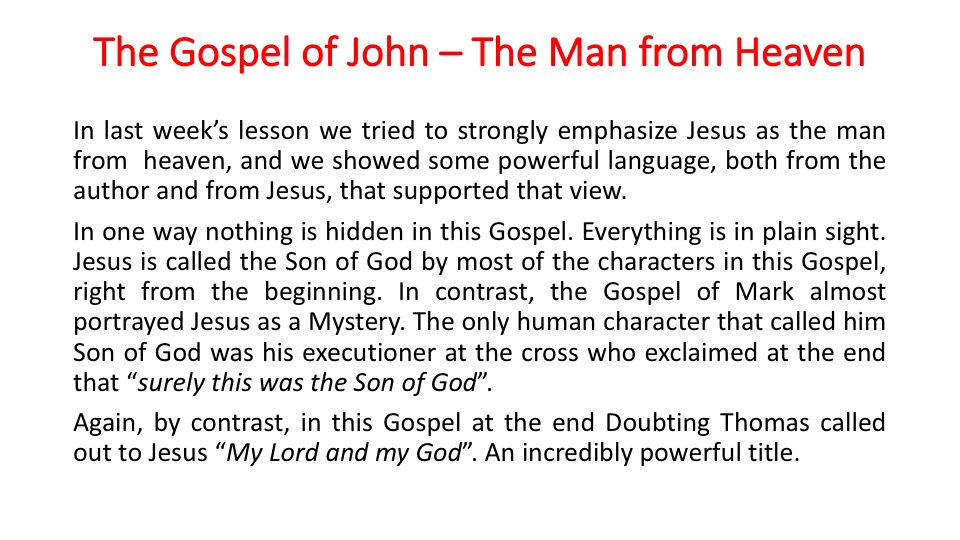
In last week’s lesson we tried to strongly emphasize Jesus as the man from heaven, and we showed some powerful language, both from the author and from Jesus, that supported that view.
In one way nothing is hidden in this Gospel. Everything is in plain sight. Jesus is called the Son of God by most of the characters in this Gospel, right from the beginning. In contrast, the Gospel of Mark almost portrayed Jesus as a Mystery. The only human character that called him Son of God was his executioner at the cross who exclaimed at the end that “surely this was the Son of God”.
Again, by contrast, in this Gospel at the end Doubting Thomas called out to Jesus “My Lord and my God”. An incredibly powerful title.
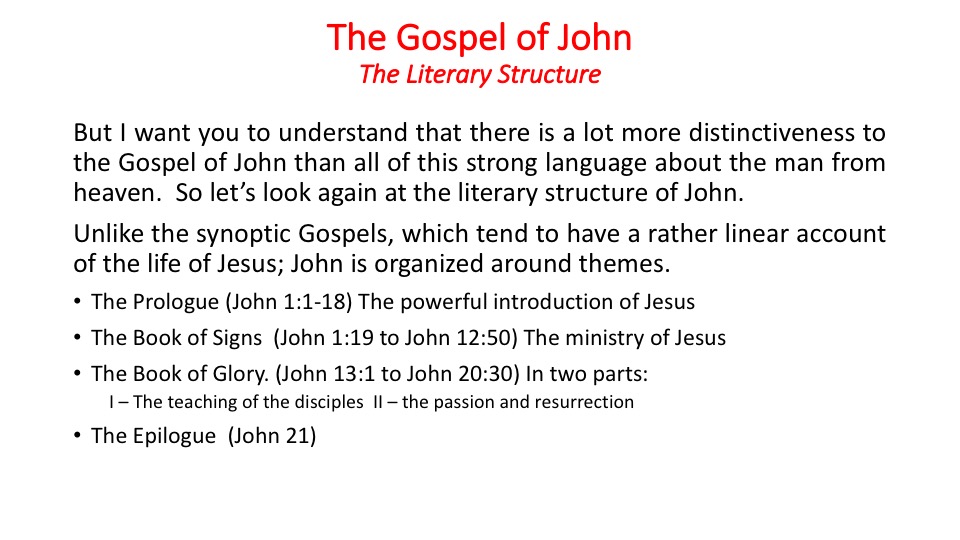
The Gospel of John
The Literary Structure of This Gospel
But I want you to understand that there is a lot more distinctiveness to the Gospel of John than all of this strong language about the man from heaven. So let’s look again at the literary structure of John.
Unlike the synoptic Gospels, which tend to have a rather linear account of the life of Jesus; John tends to be organized around themes.
- The Prologue (John 1:1-18)
- The Book of Signs (John 1:19 to John 12:50)
- The Book of Glory. (John 13:1 to John 20:30)
- The Epilogue (John 21)
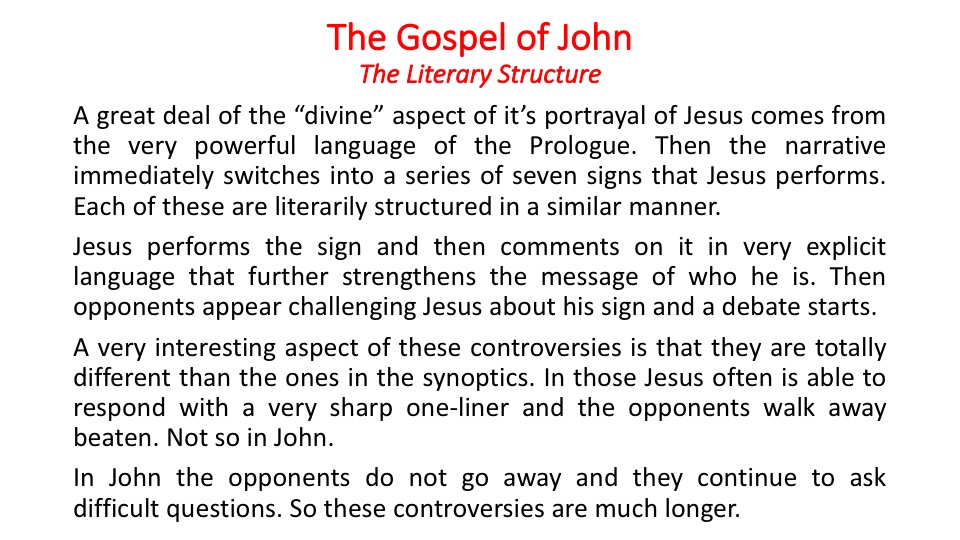
A great deal of the “divine” aspect of it’s portrayal of Jesus comes from the very powerful language of the Prologue. Then the narrative immediately switches into a series of seven signs that Jesus performs. Each of these are literarily structured in a similar manner.
Jesus performs the sign and then comments on it in very explicit language that further strengthens the message of who he is. For example, after the sign of multiplying the loaves to feed the five thousand Jesus comments "I am the bread of life". Then opponents appear challenging Jesus about his sign and a debate starts.
A very interesting aspect of these controversies is that they are totally different than the ones in the synoptics. In those Jesus often is able to respond with a very sharp one-liner and the opponents walk away beaten. Not so in John.
In John the opponents do not go away and they continue to ask difficult questions. So these controversies are much longer. And sometimes you start to wonder who is winning the argument. Eventually Jesus does win. But the interaction is a human one - the human Jesus and the human opponents. One of these arguments takes up about three pages in the Gospel.
In this Gospel the ministry of Jesus lasts three years (versus one in the other gospels). Despite returning to the Galilee several times, most of the ministry, including many of the signs, seems to occur in and around Jerusalem in Judea. In fact we see Jesus and his disciples very immersed in Judaism, attending all of the Jewish festivals in and around Jerusalem every year.
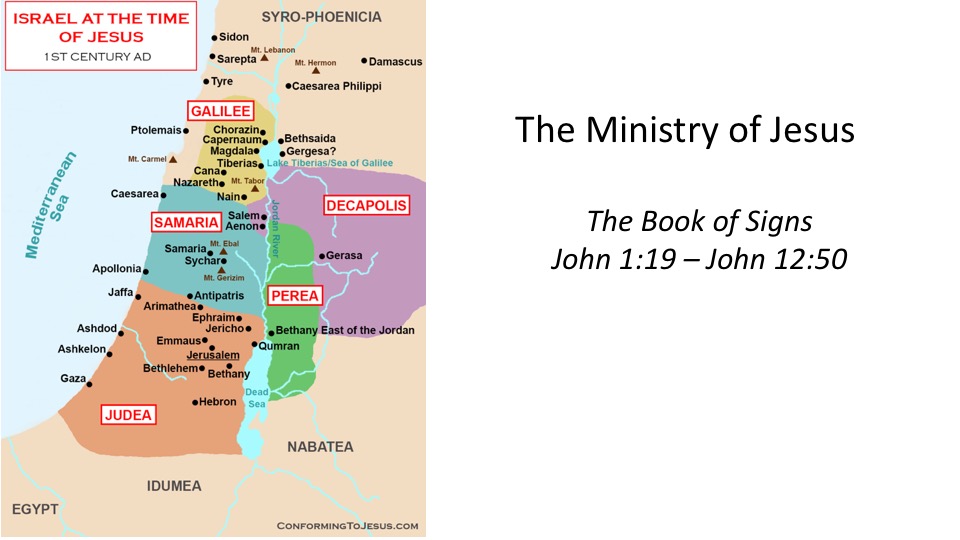
The Ministry of Jesus
The Book of Signs [ John 1:19 - John 12:50 ]
Let's turn to a map briefly to help put the Book of Signs into context. Israel in the first century consisted primarily of two areas - Judea in the south and Galilee in the north. They were both Jewish and considered the temple in Jerusalem as their holy place. But they were separated by Samaria.
We will not get into a big review of the Samaritans other than to say they were descendants of the former norther kingdom of Israel, many of which were which were carried off into captivity by the Assyrians. There were a number left behind who over time who intermarried with some of the Assyrian captors and thus were not considered to be Jewish by the Jews of Judea and Galilee. The Samaritans had their own version of Judaism, with a bible that consisted only of the first five books. They had their own temple on Mount Gerazim near the city of Sychar in Samaria.
The text of John makes it clear that the Jews and the Samaritans did not associate with each other.
The ministry of Jesus took place over three years and consisted of movement back and forth between Judea and Galilee, since Jesus and many of his initial disciples were Galileans, but as observant Jews they traveled frequently to Jerusalem to participate in various holy days. It appears that a great deal of the ministry talked about in the Book of Signs actually took place in Judea.
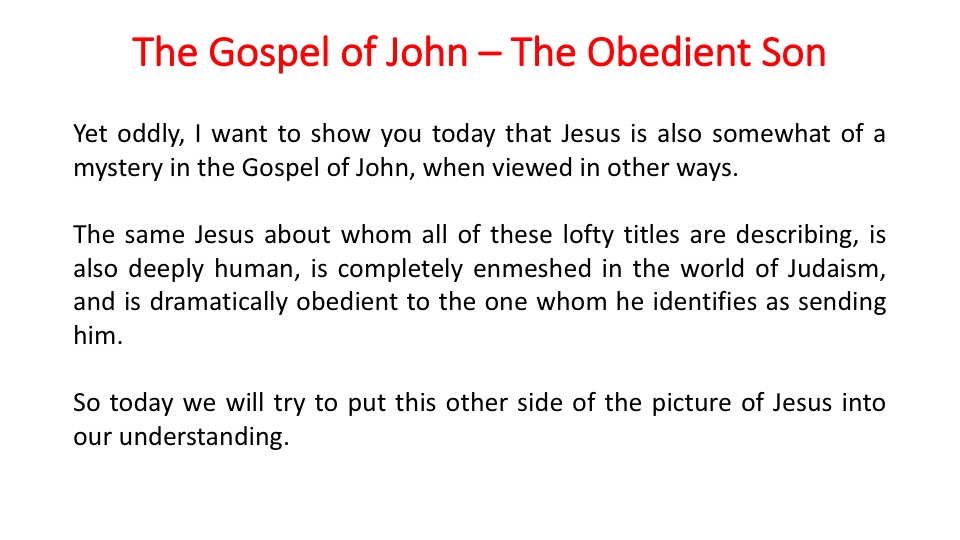
The Gospel of John – The Obedient Son
Now despite the fact that little seems to be hidden in this Gospel, meaning the language tends to be very explicit about Jesus's divinity, I want to show you today that Jesus is also somewhat of a mystery in the Gospel of John, when viewed in other ways.
This same Jesus about whom all of these lofty titles are describing, is also deeply human, is completely enmeshed in the world of Judaism, and is dramatically obedient to the one whom he identifies as sending him. A lot of this is a little more subtle but is definitely there if you read it carefully.
So today we will try to put this other side of the picture of Jesus into our understanding.
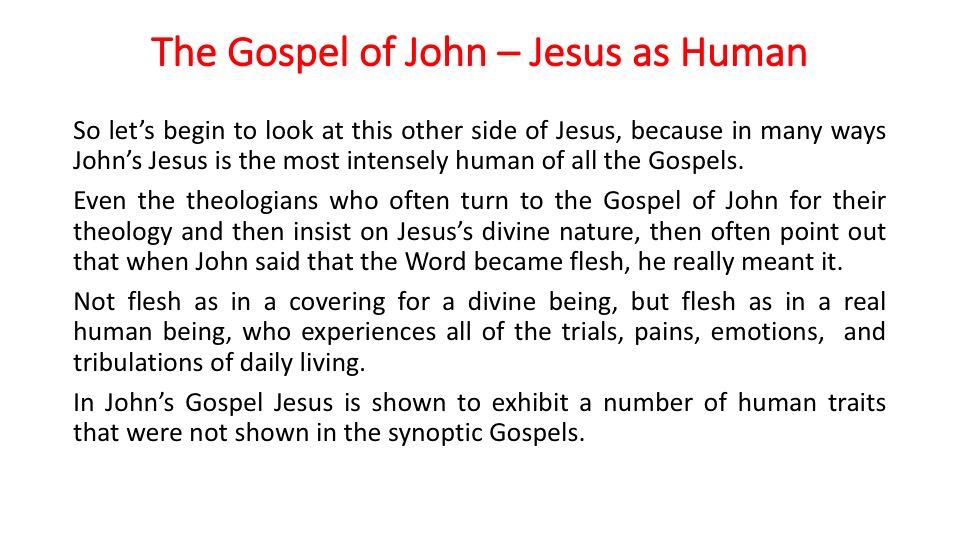
The Gospel of John – Jesus as Human
So let’s begin to look at this other side of Jesus, because in many ways John’s Jesus is the most intensely human of all the Gospels.
Even the theologians who often turn to the Gospel of John for their theology and then insist on Jesus’s divine nature, then often point out that when John said that the Word became flesh, he really meant. Not flesh as a covering for a divine person, but flesh as in a real human being, who experiences all of the trials and tribulations of living.
In John’s Gospel Jesus is shown to exhibit a number of human traits that were not shown in the synoptic Gospels.
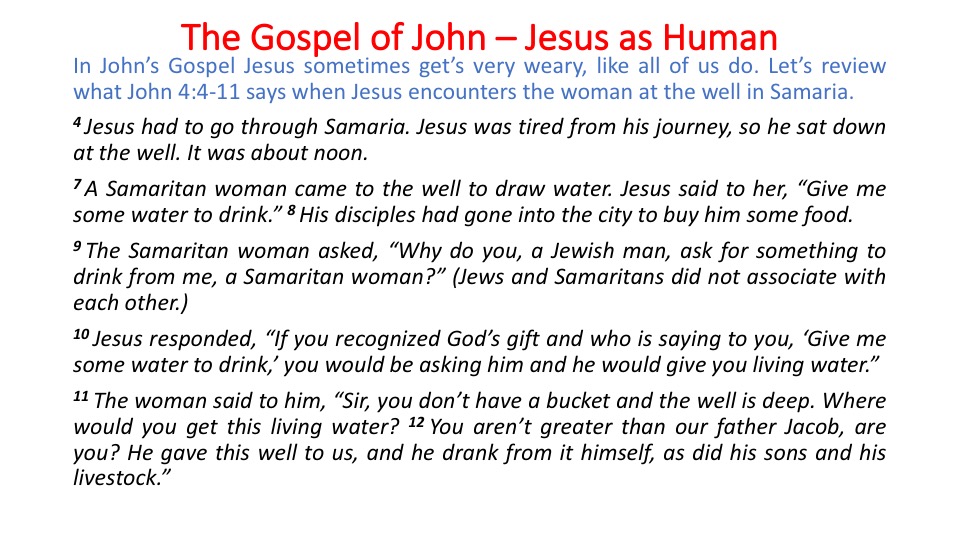
The Gospel of John – Jesus as Human
In John’s Gospel Jesus sometimes get’s very weary, like all of us do. Let’s review what John 4:4-11 says when Jesus encounters the woman at the well in Samaria.
4 Jesus had to go through Samaria. 5 He came to a Samaritan city called Sychar, which was near the land Jacob had given to his son Joseph. 6 Jacob’s well was there. Jesus was tired from his journey, so he sat down at the well. It was about noon.
7 A Samaritan woman came to the well to draw water. Jesus said to her, “Give me some water to drink.” 8 His disciples had gone into the city to buy him some food.
9 The Samaritan woman asked, “Why do you, a Jewish man, ask for something to drink from me, a Samaritan woman?” (Jews and Samaritans did not associate with each other.)
10 Jesus responded, “If you recognized God’s gift and who is saying to you, ‘Give me some water to drink,’ you would be asking him and he would give you living water.”
11 The woman said to him, “Sir, you don’t have a bucket and the well is deep. Where would you get this living water? 12 You aren’t greater than our father Jacob, are you? He gave this well to us, and he drank from it himself, as did his sons and his livestock.”
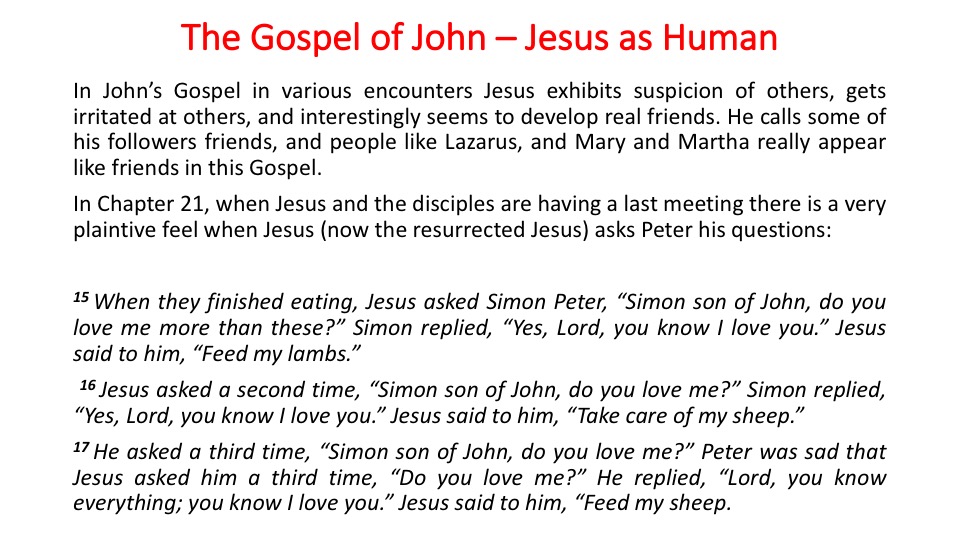
The Gospel of John – Jesus as Human
In John’s Gospel in various encounters Jesus exhibits suspicion of others, gets irritated at others, and interestingly seems to develop real friends. He calls some of his followers friends, and people like Lazarus, and Mary and Martha really appear like friends in this Gospel.
In Chapter 21, when Jesus and the disciples are having a last meeting there is a very plaintive feel when Jesus (now the resurrected Jesus) asks Peter his questions:
15 When they finished eating, Jesus asked Simon Peter, “Simon son of John, do you love me more than these?” Simon replied, “Yes, Lord, you know I love you.” Jesus said to him, “Feed my lambs.”
16 Jesus asked a second time, “Simon son of John, do you love me?” Simon replied, “Yes, Lord, you know I love you.” Jesus said to him, “Take care of my sheep.”
17 He asked a third time, “Simon son of John, do you love me?” Peter was sad that Jesus asked him a third time, “Do you love me?” He replied, “Lord, you know everything; you know I love you.” Jesus said to him, “Feed my sheep.
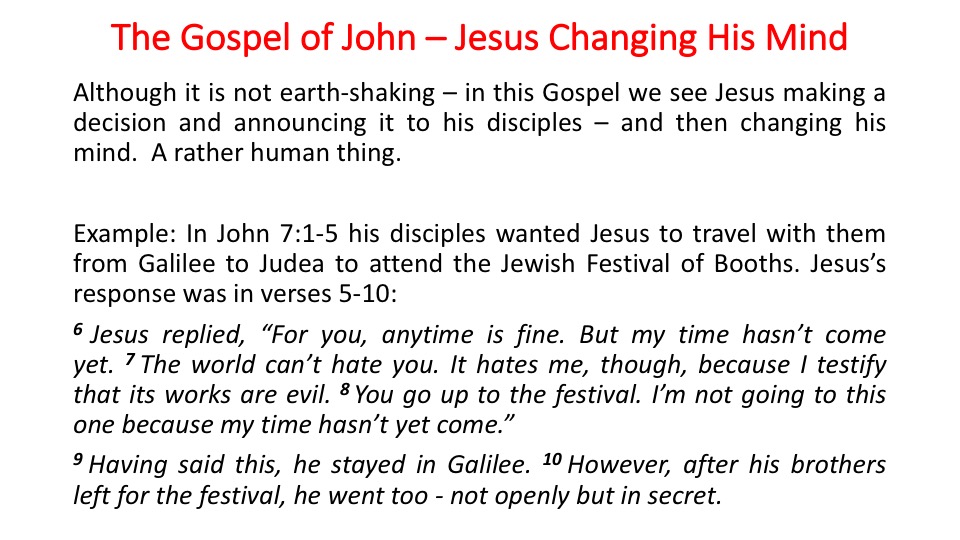
The Gospel of John – Jesus Changing His Mind
Although it is not earth-shaking – in this Gospel we see Jesus making a decision and announcing it to his disciples – and then changing his mind. A rather human thing.
In John 7:1-5 his disciples wanted Jesus to travel with them from Galilee to Judea to attend the Jewish Festival of Booths. Jesus’s response was in verses 5-10:
6 Jesus replied, “For you, anytime is fine. But my time hasn’t come yet. 7 The world can’t hate you. It hates me, though, because I testify that its works are evil. 8 You go up to the festival. I’m not going to this one because my time hasn’t yet come.”9 Having said this, he stayed in Galilee. 10 However, after his brothers left for the festival, he went too - not openly but in secret.
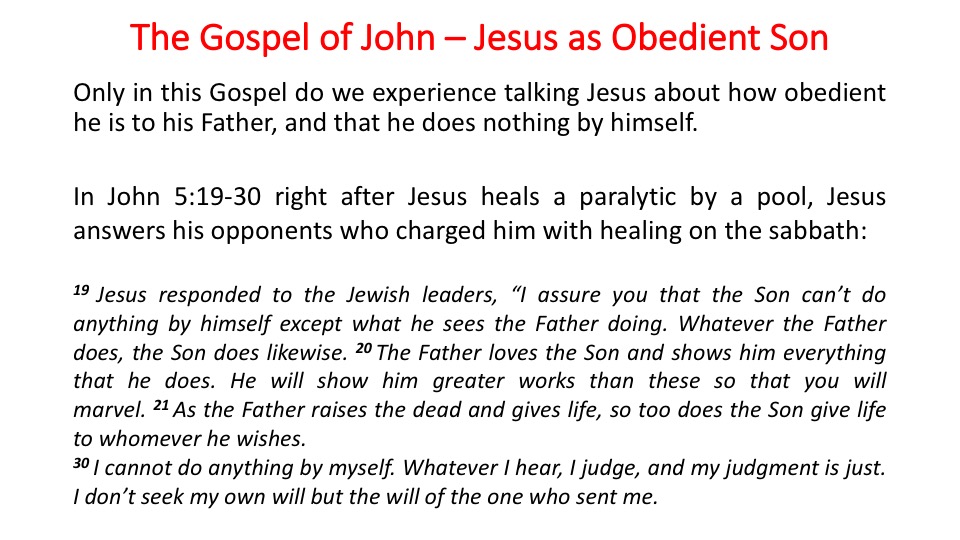
The Gospel of John – Jesus as Obedient Son
Only in this Gospel do we experience Jesus talking about how obedient he is to his Father, and that he does nothing by himself.
In John 5:19-30 right after Jesus heals a paralytic by a pool, Jesus answers his opponents who charged him with healing on the sabbath:
19 Jesus responded to the Jewish leaders, “I assure you that the Son can’t do anything by himself except what he sees the Father doing. Whatever the Father does, the Son does likewise. 20 The Father loves the Son and shows him everything that he does. He will show him greater works than these so that you will marvel. 21 As the Father raises the dead and gives life, so too does the Son give life to whomever he wishes.
30 I
cannot do anything by myself. Whatever I hear, I judge, and my judgment is
just. I don’t seek my own will but the will of the one who sent me.
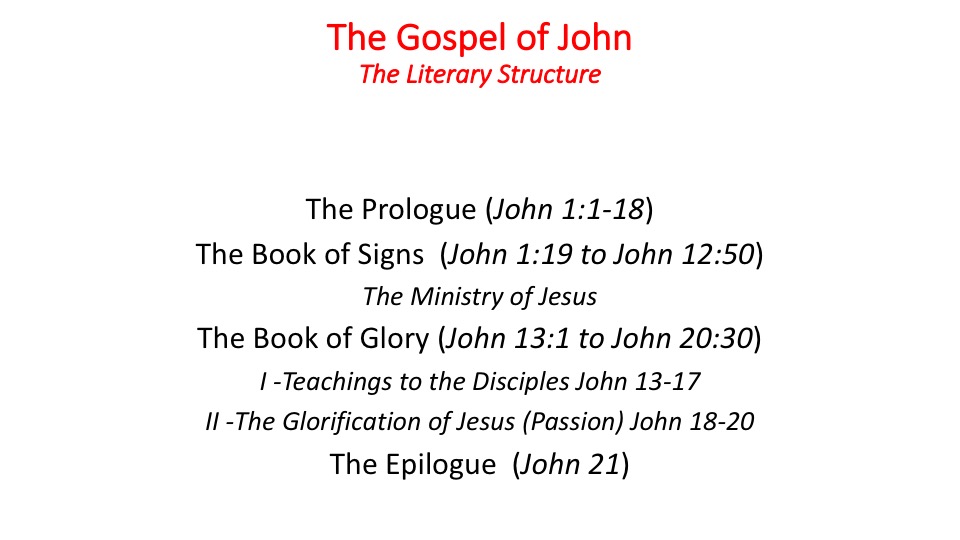
If we examine the literary structure again we are now going beyond the Book of Signs to the Book of Glory. And in particular we will pay quite a bit of attention to the te first part of this book - 5 chapters on the teachings to the disciples. There is no equivalent to this in any of the other Gospels.
The Literary Structure
The Prologue (John 1:1-18)
The Book of Signs (John 1:19 to John 12:50)
The Book of Glory (John 13:1 to John 20:30)
I -Teachings to the Disciples John 13-17
II -The Glorification of Jesus (Passion) John 18-20
The Epilogue (John 21)
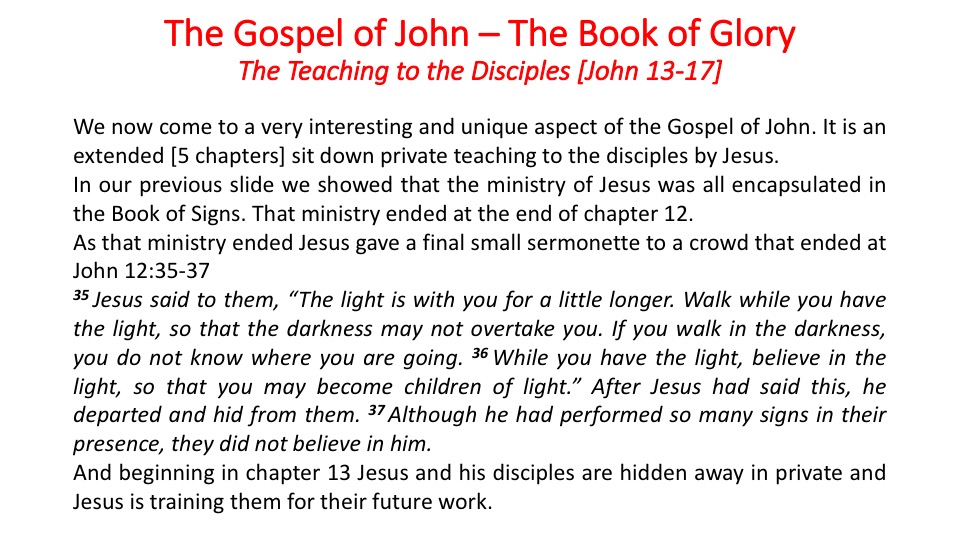
The Gospel of John – The Book of Glory
The Teaching of the Disciples [John 13-17]
We now come to a very interesting and unique aspect of the Gospel of John. It is an extended [5 chapters] sit down private teaching to the disciples by Jesus.
In our previous slide we showed that the ministry of Jesus was all encapsulated in the Book of Signs. That ministry ended at the end of chapter 12.
As that ministry ended Jesus gave a final small sermonette to a group and then John said:
35 Jesus said to them, “The light is with you for a little longer. Walk while you have the light, so that the darkness may not overtake you. If you walk in the darkness, you do not know where you are going. 36 While you have the light, believe in the light, so that you may become children of light.” After Jesus had said this, he departed and hid from them. 37 Although he had performed so many signs in their presence, they did not believe in him.
And Jesus's ministry ended at that point.
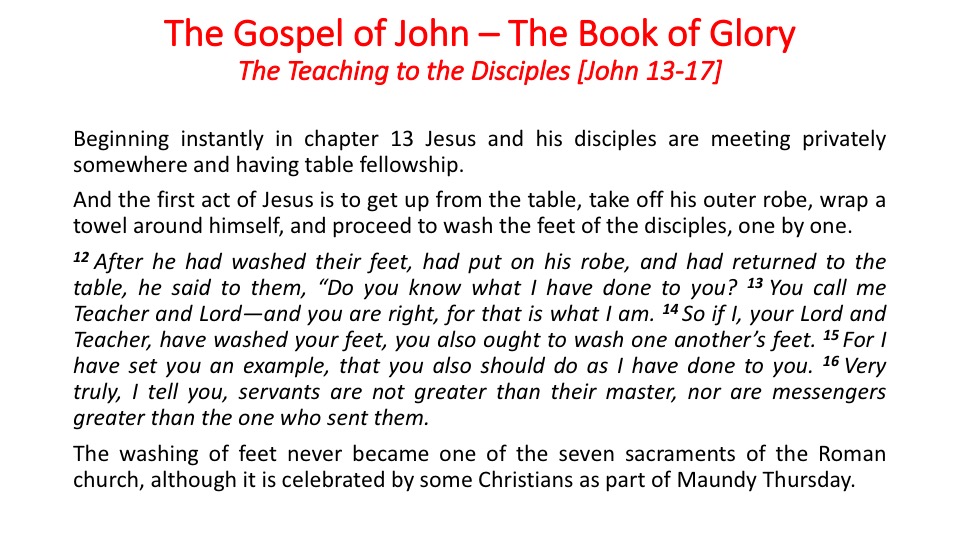
Beginning instantly in chapter 13 Jesus and his disciples are meeting privately somewhere and having table fellowship.
And the first act of Jesus is to get up from the table, take off his outer robe, wrap a towel around himself, and proceed to wash the feet of the disciples, one by one.
12 After he had washed their feet, had put on his robe, and had returned to the table, he said to them, “Do you know what I have done to you? 13 You call me Teacher and Lord—and you are right, for that is what I am. 14 So if I, your Lord and Teacher, have washed your feet, you also ought to wash one another’s feet. 15 For I have set you an example, that you also should do as I have done to you. 16 Very truly, I tell you, servants are not greater than their master, nor are messengers greater than the one who sent them.
The washing of feet never became one of the seven sacraments of the Roman church, although it is celebrated by some Christians as part of Maundy Thursday.
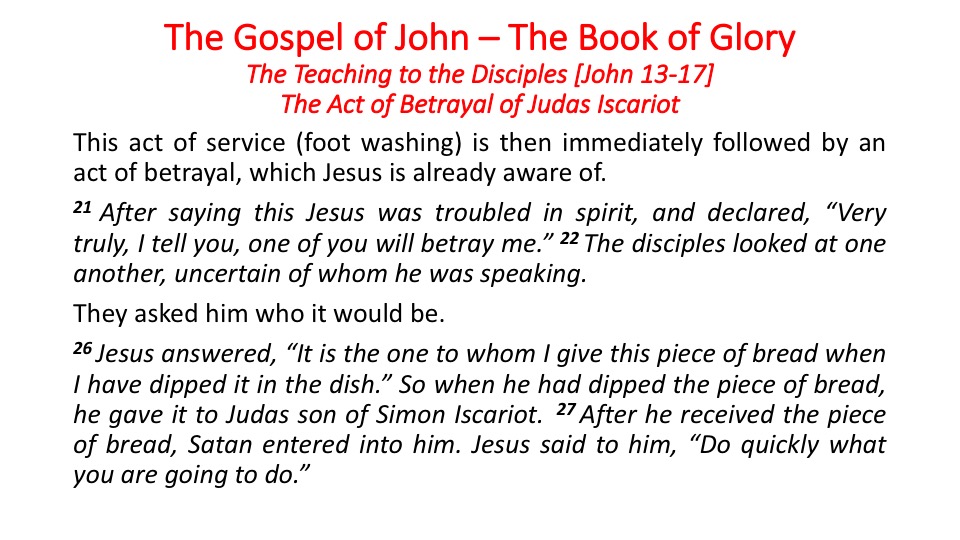
The Gospel of John – The Book of Glory
The Teaching of the Disciples [John 13-17]
The Act of Betrayal of Judas Iscariot
This act of service is then immediately followed by an act of betrayal, which Jesus is aware of.
21 After saying this Jesus was troubled in spirit, and declared, “Very truly, I tell you, one of you will betray me.” 22 The disciples looked at one another, uncertain of whom he was speaking.
They asked him who it would be.
26 Jesus answered, “It is the one to whom I give this piece of bread when I have dipped it in the dish.” So when he had dipped the piece of bread, he gave it to Judas son of Simon Iscariot. 27 After he received the piece of bread, Satan entered into him. Jesus said to him, “Do quickly what you are going to do.”
And Judas left the room and went out into the darkness.
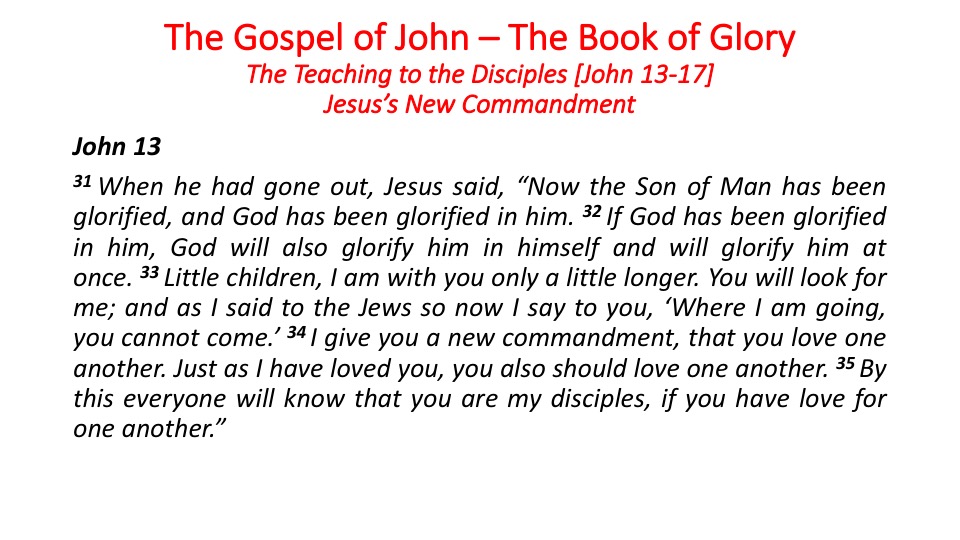
The Gospel of John – The Book of Glory
The Teaching of the Disciples [John 13-17]
Jesus’s New Commandment
31 When he had gone out, Jesus said, “Now the Son of Man has been glorified, and God has been glorified in him. 32 If God has been glorified in him, God will also glorify him in himself and will glorify him at once. 33 Little children, I am with you only a little longer. You will look for me; and as I said to the Jews so now I say to you, ‘Where I am going, you cannot come.’ 34 I give you a new commandment, that you love one another. Just as I have loved you, you also should love one another. 35 By this everyone will know that you are my disciples, if you have love for one another.”
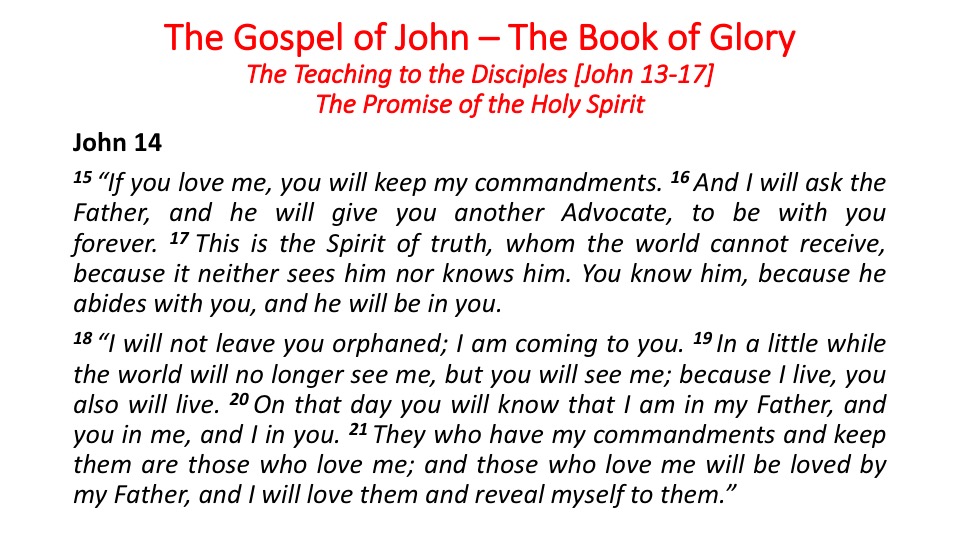
The Gospel of John – The Book of Glory
The Teaching of the Disciples [John 13-17]
The Promise of the Holy Spirit
John 14
15 “If you love me, you will keep my commandments. 16 And I will ask the Father, and he will give you another Advocate, to be with you forever. 17 This is the Spirit of truth, whom the world cannot receive, because it neither sees him nor knows him. You know him, because he abides with you, and he will be in you.
18 “I will not leave you orphaned; I am coming to you. 19 In a little while the world will no longer see me, but you will see me; because I live, you also will live. 20 On that day you will know that I am in my Father, and you in me, and I in you. 21 They who have my commandments and keep them are those who love me; and those who love me will be loved by my Father, and I will love them and reveal myself to them.”
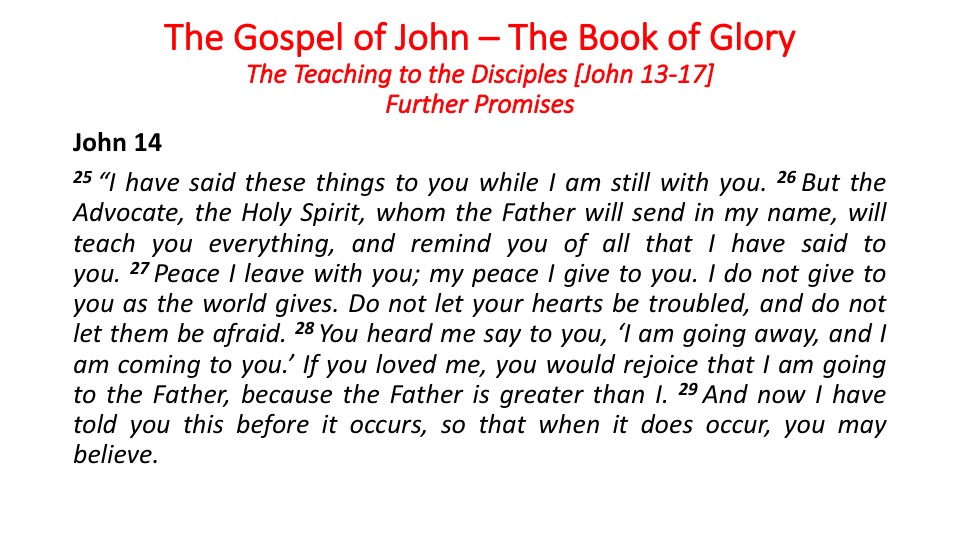
The Gospel of John – The Book of Glory
The Teaching of the Disciples [John 13-17]
Further Promises
John 14
25 “I have said these things to you while I am still with you. 26 But the Advocate, the Holy Spirit, whom the Father will send in my name, will teach you everything, and remind you of all that I have said to you. 27 Peace I leave with you; my peace I give to you. I do not give to you as the world gives. Do not let your hearts be troubled, and do not let them be afraid. 28 You heard me say to you, ‘I am going away, and I am coming to you.’ If you loved me, you would rejoice that I am going to the Father, because the Father is greater than I. 29 And now I have told you this before it occurs, so that when it does occur, you may believe.
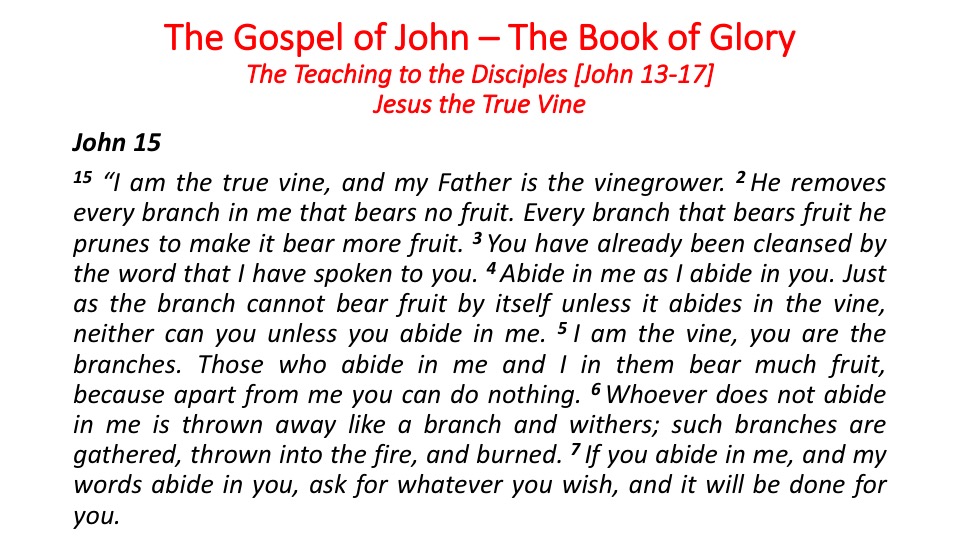
The Gospel of John – The Book of Glory
The Teaching of the Disciples [John 13-17]
Jesus the True Vine
John 15
15 “I am the true vine, and my Father is the vinegrower. 2 He removes every branch in me that bears no fruit. Every branch that bears fruit he prunes to make it bear more fruit. 3 You have already been cleansed by the word that I have spoken to you. 4 Abide in me as I abide in you. Just as the branch cannot bear fruit by itself unless it abides in the vine, neither can you unless you abide in me. 5 I am the vine, you are the branches. Those who abide in me and I in them bear much fruit, because apart from me you can do nothing. 6 Whoever does not abide in me is thrown away like a branch and withers; such branches are gathered, thrown into the fire, and burned. 7 If you abide in me, and my words abide in you, ask for whatever you wish, and it will be done for you. 8 My Father is glorified by this, that you bear much fruit and become[c] my disciples. 9 As the Father has loved me, so I have loved you; abide in my love. 10 If you keep my commandments, you will abide in my love, just as I have kept my Father’s commandments and abide in his love. 11 I have said these things to you so that my joy may be in you, and that your joy may be complete.
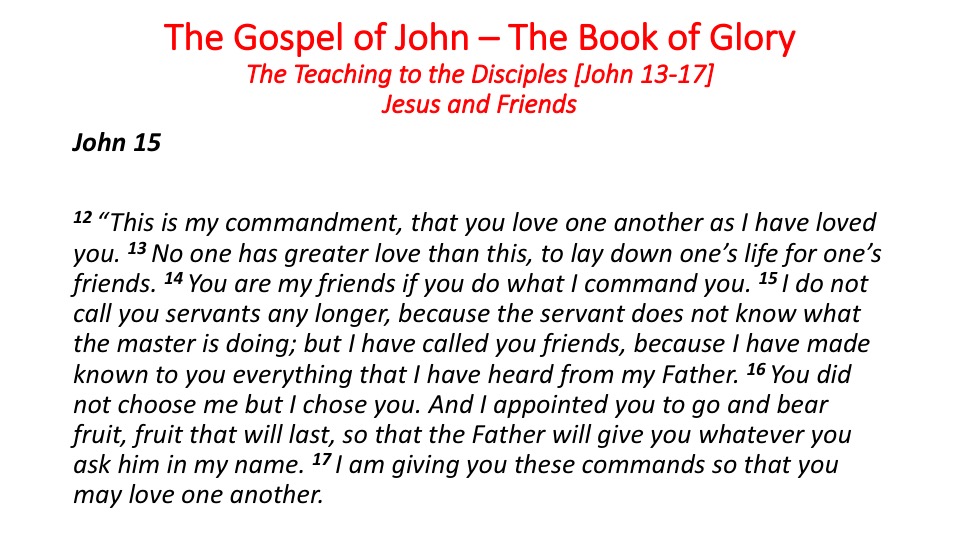
The Gospel of John – The Book of Glory
The Teaching of the Disciples [John 13-17]
Jesus and Friends
John 15
12 “This is my commandment, that you love one another as I have loved you. 13 No one has greater love than this, to lay down one’s life for one’s friends. 14 You are my friends if you do what I command you. 15 I do not call you servants any longer, because the servant does not know what the master is doing; but I have called you friends, because I have made known to you everything that I have heard from my Father. 16 You did not choose me but I chose you. And I appointed you to go and bear fruit, fruit that will last, so that the Father will give you whatever you ask him in my name. 17 I am giving you these commands so that you may love one another.
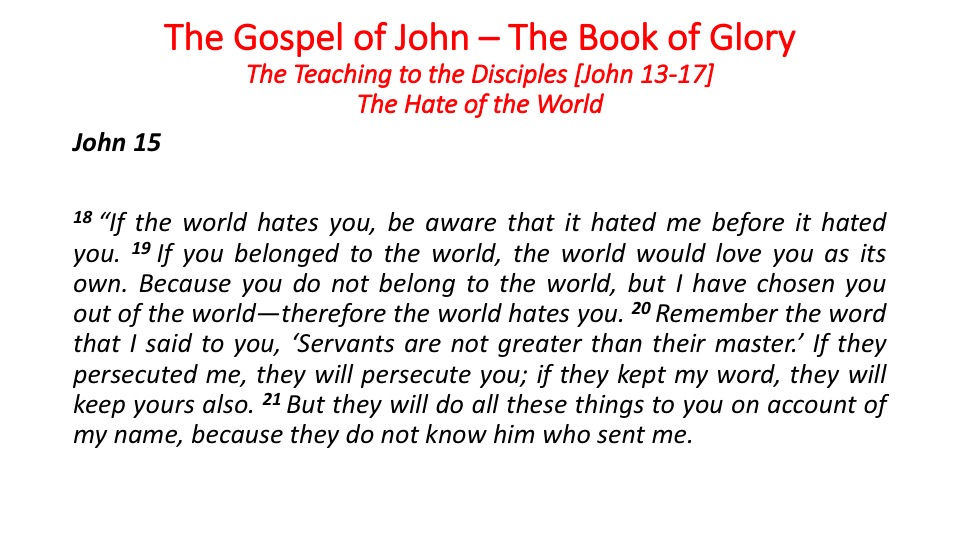
The Gospel of John – The Book of Glory
The Teaching of the Disciples [John 13-17]
The Hate of the World
John 15
18 “If the world hates you, be aware that it hated me before it hated you. 19 If you belonged to the world, the world would love you as its own. Because you do not belong to the world, but I have chosen you out of the world - therefore the world hates you. 20 Remember the word that I said to you, ‘Servants are not greater than their master.’ If they persecuted me, they will persecute you; if they kept my word, they will keep yours also. 21 But they will do all these things to you on account of my name, because they do not know him who sent me.
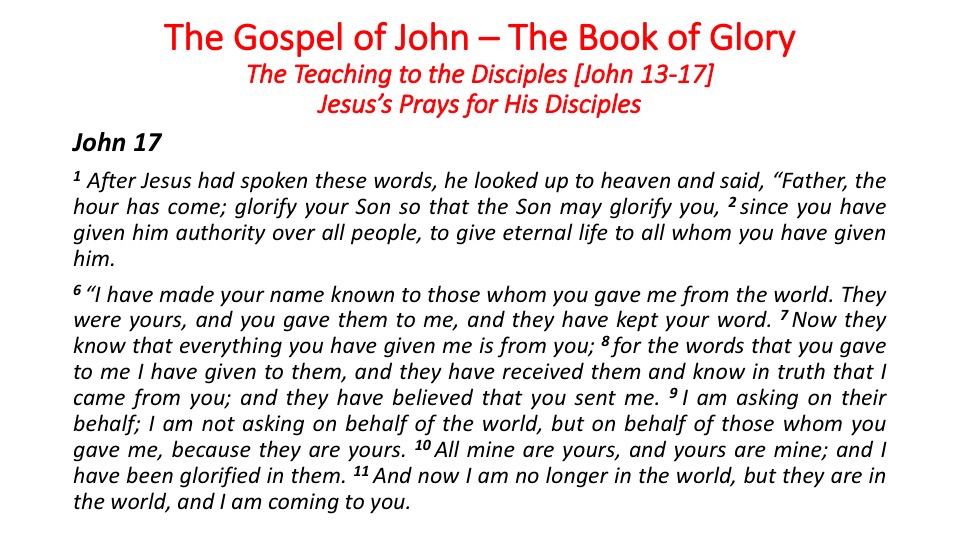
The Gospel of John – The Book of Glory
The Teaching of the Disciples [John 13-17]
Jesus Prays for his Disciples.
John 17
1 After Jesus had spoken these words, he looked up to heaven and said, “Father, the hour has come; glorify your Son so that the Son may glorify you, 2 since you have given him authority over all people, to give eternal life to all whom you have given him.
6 “I have made your name known to those whom you gave me from the world. They were yours, and you gave them to me, and they have kept your word. 7 Now they know that everything you have given me is from you; 8 for the words that you gave to me I have given to them, and they have received them and know in truth that I came from you; and they have believed that you sent me. 9 I am asking on their behalf; I am not asking on behalf of the world, but on behalf of those whom you gave me, because they are yours. 10 All mine are yours, and yours are mine; and I have been glorified in them. 11 And now I am no longer in the world, but they are in the world, and I am coming to you.
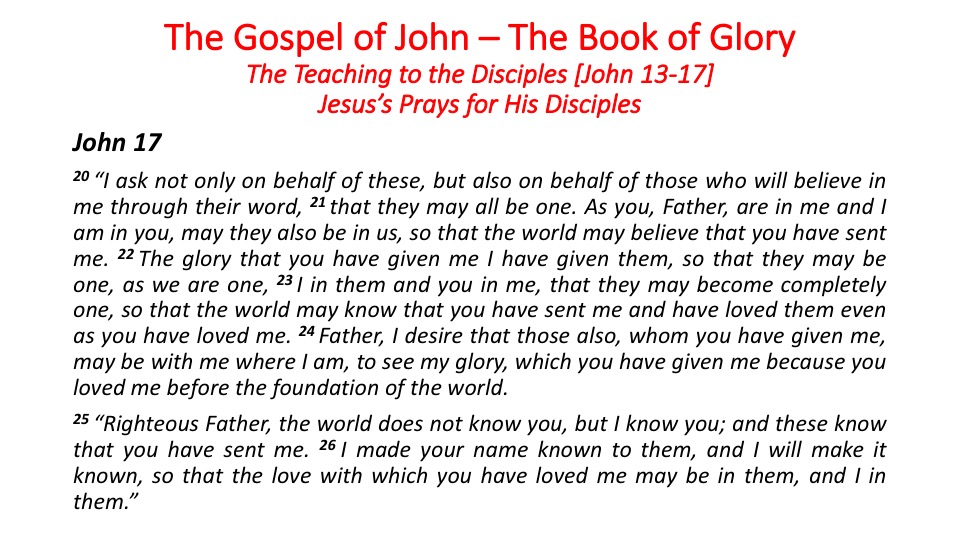
The Gospel of John – The Book of Glory
The Teaching of the Disciples [John 13-17]
Jesus’s Prays for His Disciples
John 17
20 “I ask not only on behalf of these, but also on behalf of those who will believe in me through their word, 21 that they may all be one. As you, Father, are in me and I am in you, may they also be in us, so that the world may believe that you have sent me. 22 The glory that you have given me I have given them, so that they may be one, as we are one, 23 I in them and you in me, that they may become completely one, so that the world may know that you have sent me and have loved them even as you have loved me. 24 Father, I desire that those also, whom you have given me, may be with me where I am, to see my glory, which you have given me because you loved me before the foundation of the world.
25 “Righteous Father, the world does not know you, but I know you; and these know that you have sent me. 26 I made your name known to them, and I will make it known, so that the love with which you have loved me may be in them, and I in them.”
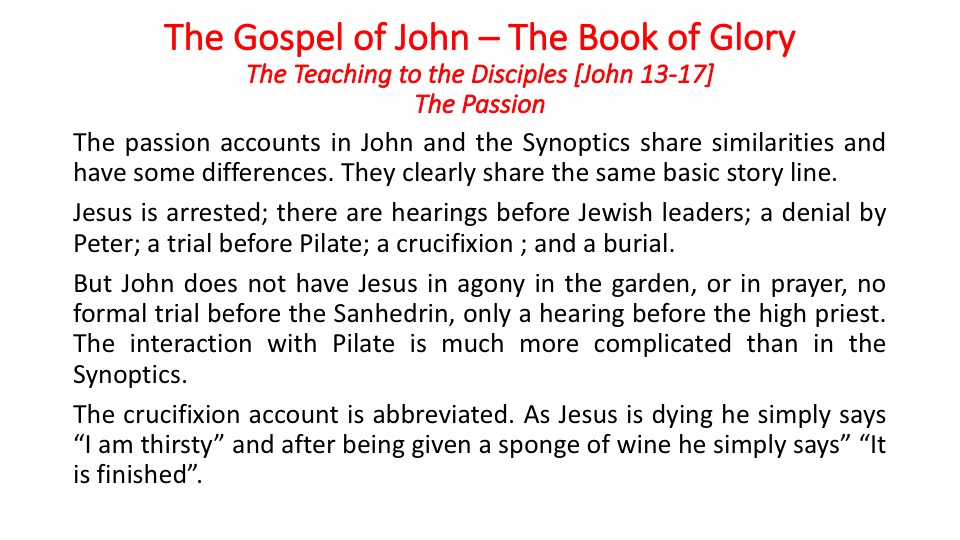
The Gospel of John – The Book of Glory
The Teaching of the Disciples [John 13-17]
The Passion
The passion accounts in John and the Synoptics share similarities and have some differences. They clearly share the same basic story line.
Jesus is arrested; there are hearings before Jewish leaders; a denial by Peter; a trial before Pilate; a crucifixion ; and a burial.
But John does not have Jesus in agony in the garden, or in prayer, no formal trial before the Sanhedrin, only a hearing before the high priest. The interaction with Pilate is much more complicated than in the Synoptics.
The crucifixion account is abbreviated. As Jesus is dying he simply says “I am thirsty” and after being given a sponge of wine he simply says” “It is finished”.
Next Week
Hassidic Tales – Sandy Kress